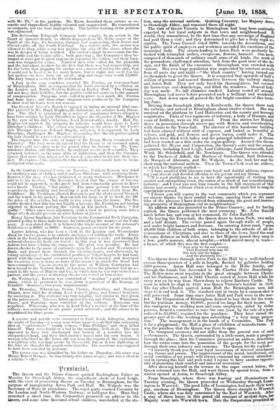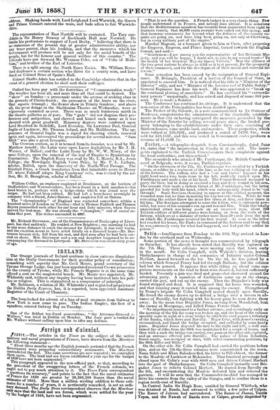Vrouintint.
The Queen and the Prince Consort quitted Buckingham Palace on Monday for Stoneleigh Abbey, the magnificent abode of Lord Leigh, with the view of proceeding thence on Tuesday to Birmingham, for the purpose of inaugurating Aston Park and Hall. Mr. Walpole was the Secretary of State in attendance. The royal party reached Coventry by The London and North-Western Railway, at half-past five. Mere they remained a short time, the Corporation presented an address to the *teen, and :ionic nine thousand school children, marshalled at the sts.- tion, sang the national anthem. Quitting Coventry, her Majesty dro; to Stoneleigh Abbey; and remained there all night.
The visit of Queen Victoria to Birmingham had long been anxiously expected by her loyal subjects in that town and neighbourhood. A would, they remembered, be the first time that any sovereign of England had paid them a visit ; and they determined to give her a truly regal re. ception. The Town Council voted 30001. towards the decorations, and the public spirit of employers and workmen seconded the exertions of the municipal body. The streets leading to Aston Park were profusely be- decked with triumphal arches evergreens, flowers, banners. One arch, composed of thousands of military small arms of all kinds, the work of the gunmakers, challenged attention, both from the good taste of the de- sign, and the finish of the execution. Birmingham was crowded with visitors. Her own huge population was augmented by constant arrivals from all parts day and night—" the black country" having turned out its thousands to greet the Queen. It is computed that upwards of half a million of persons had massed themselves between the railway station and Aston Hall. They not only lined the thoroughfares, but covered the house-tops arid church-tops and filled the windows. General holi- day was made. No tall chimiiies smoked. Labour rested all around. Birmingham had never before presented such a brilliant and wonderful scene. And down upon all poured the hot bright sunshine of this btun. ing June.
Driving from Stoneleigh Abbey to Kenilworth, the Queen there took the railway, and arrived at Birmingham about twelve o'clock. She was received on the platform by Lord Hatherton and the county and borough magistrates. Parts of two regiments of infantry, a body of Hussars, and some of Artillery, were on the ground. From the station her Majesty drove in procession through streets gay with flowers and reverberating with shouts to the Town-hall. The interior of this handsome building had been adorned without stint of expense, and looked as beautiful as velvets, and gold, and flowers and green leaves, could make it. Tke galleries were filled with ladies and the principal inhabitants. A throne had been erected on a dais under the organ-gallery. Around this throne gathered the Mayor and Corporation, the Queen's suite and the county magnates, including Lord Leigh, Lord Calthorpe, Lord Dartmouth, Lord Ward, Mr. Scholefield, and Mr. Newd%rate. The Queen was attended by the Duchess of Atholl, the Duchess of Sutherland, Earl Delawarr, the Marquis of Abereorn, and Mr. Walpole. As she took her seat the choir sang the national anthem. Then the Town-Clerk read an address, to which her Majesty replied-
" I have received with pleasure your loyal and dutiful address, express- ing your sincere and devoted affection to my person and my throne. "It is most gratifying to me to have the opportunity of visiting this ancient and enterprising town, the centre of so much of our manufacturing industry ; and I trust you may long remain in the full enjoyment of that liberty and security without which even industry itself must fail to reakiti appropriate reward. "I desire you will convey to the vast community which you represent my sincere thanks for their cordial welcome assuring them at the saint time of the pleasure I have derived from witnessing the great and increas- ing prosperity of Birmingham and its neighbourhood." An address was also presented to the Prince Consort; and he having replied, the Queen performed the next ceremony. Mr. John Ratchi
knelt before her, and rose at her command, Sir John Iinteliff. .
On leaving the Town-hall, the Queen drove to Aston Park, two miles and a half distant. The cortege passed again through walls of people, and under bright banners and festoons. On entering Aston road, "some 40,000 little children of both sexes, belonging to the schools of all de- nominations of Christians, and also to those of the Jews, lined the road for some distance on both sides, and as her Majesty passed they sang in a low, gentle manner, almost seraphic,—which moved many to tears— a hymn, of which this was the first couplet— "'Now pray we for our country,
That England long may be, The holy and the happy, And the gloriously free.'"
The Queen drove through Aston Park to the Hall by a well-timbered avenue three-quarters of a mile in length, flanked by galleries holding 5000 persons. Aston Hall once belonged to the Hoke family, and through the female line descended to Mr. Charles Hoke Bracebridge. The Holies were stout royalists in the great struggle between Charles and his Parliament, and in 1642 Charles rested at Aston Hall while his army was on its way from Shrewsbury to relieve Banbury Castle. The room in which lie slept in 1642 was Queen Victoria's boudoir in 1858. The day after Charles quitted Aston Hall the Birmingham men laid siege to it and took it. The standard rent in twain by a cannon-shot is still preserved. Some time since Aston Hall and Park were in the mar- ket. The Corporation of Birmingham desired to buy them for the town, bat the purchase money, 40,0001., proved too large for their means. lii this emergency the working men and some employers, aided by richer persons, formed a committee to raise the sum (now, by the sale of apart, reduced to 35,000/0 required for the purchase. They have raised the greater part of it—the working men subscribing "a very large propor- tion." The management is in the hands of a Committee. The Park is for a playground ; the Hall a place of exhibition of manufactures. It was the purchase that the Queen was there to open.
The inaugural ceremony did not differ from the general run of such performances. The Queen, surrounded by a little court, made a progress through the place; then the Committee presented an address, describing how the estate came into the possession of the 'people for the most part through their own industry and economy. The Queen briefly replied-
" I sincerely thank you for your loyal assurances of devoted attachment to my throne and person. The improvement of the moral, intellectual, and social condition of my people will always command my earnest attention ; and in opening this hall and park today I rejoice to have another opportu- nity of promoting their comfort and innocent recreation."
After showing herself on the terrace to the eager crowd below, the Qneen returned into the Hall, and went thence by special train, from station opened at Aston, to Stoneleigh Abbey.
From Stoneleigh, where there was feasting and illuminations 'au Tuesday evening, The Queen proceeded on Wednesday through Leam- ington to Warwick. The good folks of Leamington had made their toWn gay, emulous of Birmingham. The Queen drove straight to Warwick Castle, where she was duly entertained by the Earl of Warwick. After a stay of three hours in this grand old remnant of ancient days, her Majesty went into Warwick town. Here the Corporation presented an address. Flaring hands with Lord Leigh and Lord Warwick, the Queen and prince Consort entered the train, and bade adieu to fair Warwick- shire.
The representation of East Norfolk will be contested. The Tory can- didate is Sir Henry Stracey of Rackheath Hall near Norwich. He limas his professions to support of Lord Derby, "believing that there is no statesman of the present day of greater administrative ability, nor any truer patriot, than his lordship, and that the measures which his Government will produce will be not only for the social benefit of the people but for the honour and general welfare of this country." The Liberals have put forward Mr. Wenman Coke, son of "Coke of Holk- ham," and brother of the Earl of Leicester.
There is a split among the North Essex Tories. Mr. William Beres- ford displeases a certain section who thirst for a county man, and have fixed on Colonel Brise of Spain's Hall.
Colonel Shafto Adair has notified to the Cambridge electors that in the event of a general election he shall seek their suffrages.
Oxford has been gay with the festivities of "Commemoration week." The weather has been all, and more than all that could be desired. The "show" on Sunday—a promenade under the avenue of arching elms in the grounds of Christchurch; the procession of the boats on the river, that aquatic triumph ; the flower show in Trinity Gardens ; and above all, the great doings in the Sheldonian Theatre on Wednesday, were as vigorously sustained as ever. There was as much boisterous mirth in the theatre galleries as of yore. The " gods " did not disguise their pre- ferences and antipathies, and cheered and hissed each name as it was shouted with great goodwill. Honorary degrees were conferred upon Lord Stratford de Redcliffe, Lord Eversley, Sir Lawrence Peel, General Inglis of Lucknow, Mr. Thomas Acland, and Mr. Halliburton. The ap- pearance of General Inglis was a signal for cheering which, renewed again and again, interrupted the proceedings for several minutes. "Sam Slick" was also a great favourite.
The Crewian oration, as it is termed from its founder, was read by Mr. Matthew Arnold ; the Latin verse upon Lacus Asphaltites, by Mr. J. H. Warner' of Balliol ; and the Latin'Essay by Mr. W. W. Merry, of the same College, upon the removal of the seat of Empire to Byzantium by Constantine. The English Essay was read by Mr. L. Morris, B.A., Jesus College; the Newdigate English Verse Prize, by Mr. F. L. Latham, scholar, Bailie', upon the discovery of the North-West Passage. The Gaisford Prize, a Greek translation from that inimitable scene in Henry IV. where Falstaff adopts Ring Cambyses' vein, was recited by the au- thor, Mr. R. Broughton, scholar of Balliol.
William Collier, an engineer employed at Brockmoor, on the borders of Staffordshire and Worcestershire, has been found in a field murdered—his head beaten in, perhaps with a hedge-stake which was found near the Corpse. He had not been robbed. He had left a beer-house overnight in company with a friend, Jabez Onions ; and suspicion fell on Onions.
The " championship " of England was contested somewhere within a hundred miles of London on Tuesday—that is Thomas Paddock and Thomas Sayers pummelled each other for one hour and forty minutes, when Sayers proved the best man. He was already the "champion," and of course re- tains that post. The stakes amounted to 400/.
Mr. Richard Stevenson, one of the Commissioners of Bankruptcy at Liver- pool, has died suddenly. He resided at New Brighton ; one morning he had to run some distance to catch the steamer for Liverpool ; it was very warm, and the exertion seems to have acted fatally on a diseased heart—Mr. Ste- venson became sick, fell from his seat, and died 80011 after he had been ear- ned on shore. Mrs. Stevenson and a son and daughter happened to be ac- companying the deceased to Liverpool. Mr. Stevenson was about sixty years of age.



























 Previous page
Previous page